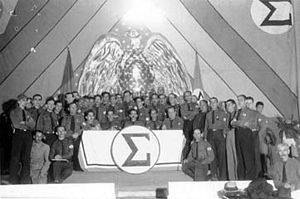Creeperian Pro-Fatherland Front
Creeperian Pro-Fatherland Front Frente Pro-Patria Creeperiano | |
|---|---|
 | |
| Caudillo and founder | Carlos Hernández Videla |
| Founded | November 9, 1921 |
| Dissolved | October 4, 1949 |
| Merger of | Catholic Royalist Party (splinter) Creeperian Fascist Party League of Creeperian Fascists |
| Preceded by | Creeperian Fascist Union |
| Succeeded by | Creeperian Initiative |
| Headquarters | San Salvador, San Salvador, Creeperopolis |
| Newspaper | ¡Adelante! |
| Student wing | Grupo Fascista de Estudiantes |
| Youth wing | Fascistas Jóvenes |
| Paramilitary wing | Camisas Negras |
| Membership (1933) | 300,000 |
| Ideology | Creeperian Fascism • Monarchism • Creeperian Nationalism • Corporatism • Anti-Communism • National Conservatism • Social Conservatism |
| Political position | Far-Right |
| National affiliation | Creeperian Conservative Coalition (since 1927) |
| Colors | Creeperian Black |
| Slogan | "¡El Fascismo es la’Justicia!" ("Fascism is Justice!") |
| Anthem | ¡Adelante!" ("Forward!") |
| Parliament | 3 / 100 (1927)
|
| Party flag | |
 | |
Politics of Creeperopolis Politcal Parties of Creeperopolis Elections | |
| Part of a series on |
| Romerism |
|---|
 Cross of Creeperopolis (symbol of Romerism) |
|
The Creeperian Pro-Fatherland Front (Creeperian Spanish: Frente Pro-Patria Creeperiano) was a far-right militarist Creeperian political party during the Second Parliamentary Era. The party was a member of the Creeperian Conservative Coalition from 1927.
History
Formation
The Creeperian Pro-Fatherland Front, abbreviated FPPC and also called “the Front” (“El Frente”), was founded on November 9, 1921, as a splinter group from the Catholic Royalist Party and a merger with the Creeperian Fascist Party. It was lead by Carlos Hernández Videla, the leader of the Creeperian Fascist Party (and earlier, the League of Creeperian Fascists), from 1921 until 1949. Hernández Videla styled himself as Caudillo of the Front.
The Fascist organization refused to join the Creeperian Conservative Coalition as the party wanted sole-Parliamentary rule over Creeperopolis.
The Front was the first major Fascist party in Creeperopolis.
Attempted Coup D'état
In the December 1923 Creeperian General Election, the Front failed to gain a single seat in the Creeperian Parliament despite gaining over one percent of the total national vote. Carlos Hernández Videla was convinced that democracy had failed him, the party, and the Fatherland, and began arranging a “Grand Revolution” to bring Fascism to Creeperopolis.
Hernández Videla organized his party’s paramilitary detachment, the Camisas Negras (Creeperian Spanish for “Black Shirts”), in preparation for the upcoming coup d’état and Revolution. The coup was set for December 25, 1923. The plan was to topple the government while the Creeperian people and the government were celebrating the birth of Jesus. He believed that no one would be able to stop him and his Camisas Negras from seizing power.
On December 24, the Creeperian Police arrested a drunk member of the Front who started a brawl in a beer hall in San Salvador. The police found a letter on the man detailing the coup plan. The government was immediately notified and Prime Minister Rafael Antonio Gutiérrez immediately ordered the Creeperian Army to be stationed in San Salvador to crush the coup on December 25.
When the day came, 4,000 Camisas Negras paramilitary soldiers marched on the streets of San Salvador and marched to the Parliament building. As the soldiers were just under one mile from the Parliament, the Army appeared and began an engagement with the Camisas Negras. The firefight lasted just under 30 minutes with most Camisa Negras fleeing the scene. Official reports list 35 Camisas Negras and 11 Army soldiers died and 1,212 Camisas Negras were arrested, including Hernández Videla.
Hernández Videla and other Front leaders were put on trial for high treason and faced the death penalty, but the sympathetic judges only sentences him and the front members to a one year prison sentence. Hernández Videla was released from prison on February 28, 1925. He quickly returned to lead the Front and transitioned the party to abide by the democratic system as a means to gain total power.
Conforming to Democracy
Following the Christmas Putsch and his release from prison, Hernández Videla began moving the Front to align with the democratic system as the way to gain absolute power in Creeperopolis. The Front began to spread anti-Protestant and anti-Communist propaganda to increase their numbers and vote count for the upcoming 1927 general election.

Hernández Videla also joined the Creeperian Conservative Coalition to potentially gain more voters as he believed that voters would vote for the Front if they were a member of a coalition as it makes them seem powerful and strong. The Front officially joined in October 1927, two months before the election.
In the 1927 election, the Front gained three seats in the Parliament, the first time the party has been legally represented in the government.
The Front’s chief rival within the coalition was the Catholic Royalist Party, from where part of the party splintered from.
The Front’s biggest rival was the Creeperian Social Communist Party. Both parties saw each other as the greatest threat to Creeperian prosperity. As a result, both the Camisas Azules and the Camisas Rojos (the paramilitary wing of the PCSC) frequently fought in the streets in an attempt to intimidate each other and the voters. These clashes from 1921-1933 were commonly called the “Creeperian Civil War” before the actual Creeperian Civil War to satire the parties’ violent rivalry. The rivalry is now called the Reigns of Terrors in the post-Civil War age.
In preparation for the 1931 election, the Camisas Negros continued to intimidate political opponents by engaging with the Camisas Rojos in the streets. The Front won six additional seats in the election increasing their total seats to nine.
Creeperian Civil War
Upon hearing of the outbreak of the Creeperian Civil War, the Front declared its full support for Emperor Romero I and the Catholic Imperial Restoration Council in the “Crusade against Communism.”
With the Parliament de facto dissolved, the Front resorted to spreading anti-communist propaganda on a daily basis to rally support for the Catholic Imperial Restoration Council, the Romerists, and hate for the National Council for Peace and Order, the Miguelists. The Camisas Negras also began receiving government funding and weapons to help fight the communists.
The Camisas Negras and the Front were notable for participating in the Denshire Massacre after one of their most powerful members, Adolfo Cabañeras Moreno, was assassinated in La’Libertad.
Merger into the Initiative
After the end of the Civil War on September 30, 1949, the Front along with the Creeperian Peoples' Catholic Front, the Creeperian Catholic Party, the National Conservative Party, and the Catholic Royalist Party merged to form the Nationalist Creeperian Catholic Royal Initiative and the Pro-Fatherland Front of Unification. The Camisas Negras were merged into the División Negra and the Creeperian Imperial Guard in January 1950.
Ideology
Nationalism
Nationalism, specifically Creeperian Nationalism was one of the bases and strongpoints of the Front.
Fascism
Fascism was the primary ideology of the Front. They believed that a fascist revolution was inevitable and that it would save Creeperopolis from a red death (communism).
Legacy
Notable Members
| Member | Known For |
|---|---|
| Carlos Hernández Videla | Party Leader and organizer of the Christmas Putsch |
| Adolfo Cabañeras Moreno | Creeperian Chief Field Marshal and Minister of Defense from 1931-1944 |
| Alfonso Cabañeras Moreno | Creeperian Chief Field Marshal and Minister of Defense from 1944-1976 |
Election Results
| Parliament of Creeperopolis | |||||
| Election year | Votes | % | Seats | +/− | Leader |
|---|---|---|---|---|---|
| 1922 | NUMBER | 1.28% | 0 / 100
|
||
| 1927 | NUMBER | 2.15% | 3 / 100
|
||
| 1932 | NUMBER | 3.12% | 0 / 100
|
||
Party Symbols
Logos
Anthem
| Creeperian Spanish | Translation |
|---|---|
PRIMERA ESTROFA
SEGUNDA ESTROFA
TERCERA ESTROFA
|
FIRST VERSE
SECOND VERSE
THIRD VERSE
|
March
| Creeperian Spanish | Translation |
|---|---|
PRIMERA ESTROFA
SEGUNDA ESTROFA
TERCERA ESTROFA
|
FIRST VERSE
SECOND VERSE
THIRD VERSE
|


